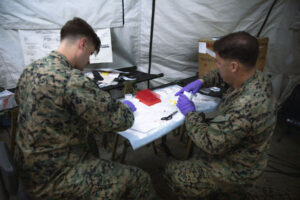
Story by Sgt. Nello Miele
I Marine Expeditionary Force
CAMP KATUU, Palau – U.S. Marines and Sailors with Combat Logistics Battalion 13, Combat Logistics Regiment 17, 1st Marine Logistics Group, established the first Role 2 medical field hospital in Palau during exercise Valiant Shield 24 at Camp Katuu, Palau, June 7-18, 2024.
When Navy corpsmen and Marine Corps engineers combine their efforts, they can swiftly convert an empty field into a fully equipped medical field hospital.
“Once we touch the ground, the Role 2 is operational in four hours and can support a regiment for up to 60 days,” said U.S. Navy Lt. Jenniffer Katekintha, the officer in charge of the Role 2 medical field hospital and an emergency room nurse with CLB-13.
The mobile hospital was shipped to Palau in quadcon dry shipping containers. It is expedient and tactical — outfitted with camouflage netting — but has a comprehensive array of medical supplies and essential utility equipment. This setup enables the CLB-13 medical staff to deliver crucial life-saving care in challenging field conditions.
The Role 2 medical field hospital consists of both a Shock Trauma Platoon and a Forward Resuscitative Surgical System. This mobile medical facility can provide laboratory services, X-rays, dental support, damage control surgery, resuscitative surgical support, holding, and en route care capability, explained Katekintha, a native of Anaheim, California. The medical staff works around-the-clock, ready to respond to medical emergencies at a moment’s notice, ensuring the highest level of readiness and critical care for service members operating in isolated areas.
The operating room and the supply of tested and type-verified blood grant the facility its Role 2 classification. Verified blood is essential for stabilizing patients and reducing the risk of adverse reactions from transfusions. Petty Officer 2nd Class Seth Robinson and Petty Officer 2nd Class Wyatt Koenig, both laboratory technicians with CLB-13, meticulously verified the accuracy of the blood using Eldon Cards. These cards are made of special plastic with dried antibody formulations, widely used by hospitals, blood banks, blood centers, and forward field medical facilities.
After verifying the blood, the medical facility was officially designated as a Role 2, marking a historic first for Marines and Sailors operating in Palau.
“We are setting the precedence for Navy medicine by combining different units together to make a Role 2,” Katekintha said.
On June 8, the CLB-13 medical team initiated a walking blood bank to increase their supply of verified blood without relying on the transported blood. Following a major injury, blood transfusions can save a service members life, but transporting and storing prepared blood is logistically difficult even in the best of circumstances. Low titer type O blood is also critical to the balanced resuscitation of a patient. Low titer means that the likelihood of an adverse reaction to an O blood transfusion is low.
The walking blood bank establishes a plan for pre-screened volunteers with type O blood to donate during emergent needs prior to a patient being transported for extended medical care. The Role 2 medical team screened each volunteer donor and entered their name in a database.
Using the walking blood bank, blood can be obtained and given to critically ill patients in an emergency setting with simplified logistics and minimal risk to the patient. The ability to identify low titer type O Marines and Sailors provides an agile and flexible approach to accessing the lifesaving measures that whole blood provides, said Katekintha.
The Role 2 medical field hospital team put their skills to the test during a mass casualty exercise on June 16. During the event, simulated casualties were transferred from the USS Ronald Reagan (CVN 76) to the Role 2 medical field hospital where they were swiftly triaged and treated. The joint training evolution demonstrated the joint force’s ability to cohesively respond to incidents exceeding any unit’s normal emergency response resources available, and quickly transfer and track patients across the western Pacific.
This CLB-13 medical team’s achievements during Valiant Shield 24 underscores the collaboration of the U.S. Navy and Marine Corps, demonstrating their capability to provide advanced medical care in austere environments and respond to crisis when called upon.